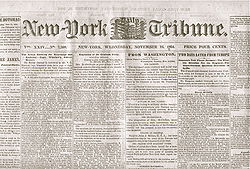New York Tribune

Front page of the New-York Tribune no. 7,368
November 16, 1864 |
|
| Type | Daily newspaper |
|---|---|
| Format | Broadsheet |
| Founded | 1841 |
| Ceased publication | 1966 |
| Headquarters | New York, New York, U.S. |
The New-York Tribune was an American newspaper, first established by Horace Greeley in 1841. Between 1842 and 1866, the newspaper bore the name New-York Daily Tribune. From the 1840s through the 1860s it was the dominant Whig Party and then Republican newspaper in the U.S. The paper achieved a circulation of approximately 200,000 during the decade of the 1850s, making it the largest in New York City and perhaps the nation. The Tribune's editorials were widely read and helped shape national opinion.
In 1924 it was merged with the New York Herald to form the New York Herald Tribune, which in turn ceased publication in 1966.
Tribune was created by Horace Greeley in 1841 with the goal of providing a straightforward, trustworthy media source in an era when newspapers such as the New York Sun and New York Herald thrived on sensationalism. Greeley had previously published a weekly newspaper, The New Yorker (unrelated to the modern magazine), in 1833, and was also publisher of the Whig Party's political organ, Log Cabin. In 1841, he merged operations of these two publications into a new newspaper, the New-York Tribune.
The Tribune did reflect some of Horace Greeley's idealist views. The journal retained Karl Marx as its London-based European correspondent in 1852. The arrangement provided Marx with much needed income during a period of his life in which his friend and collaborator Friedrich Engels could only provide limited financial support. The arrangement, whereby Engels also submitted articles under Marx's by-line, lasted ten years, with the final Marx column being published in February 1862.
During Greeley's editorship, the paper was aided by able writers including Charles Anderson Dana, George William Curtis, William Henry Fry, Bayard Taylor, Margaret Fuller, George Ripley, Julius Chambers and Henry Jarvis Raymond.
...
Wikipedia
